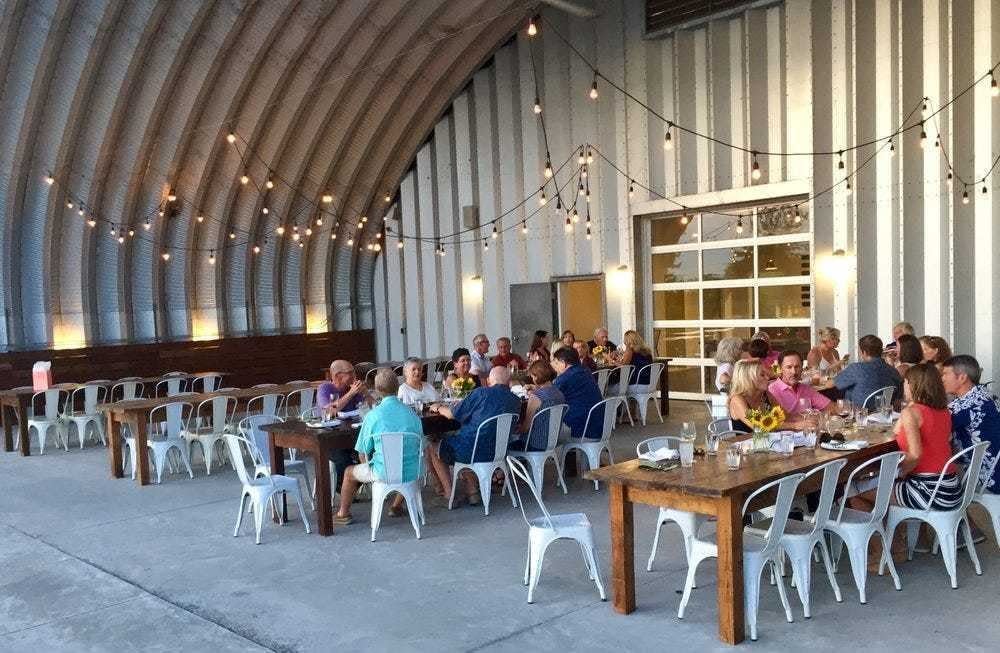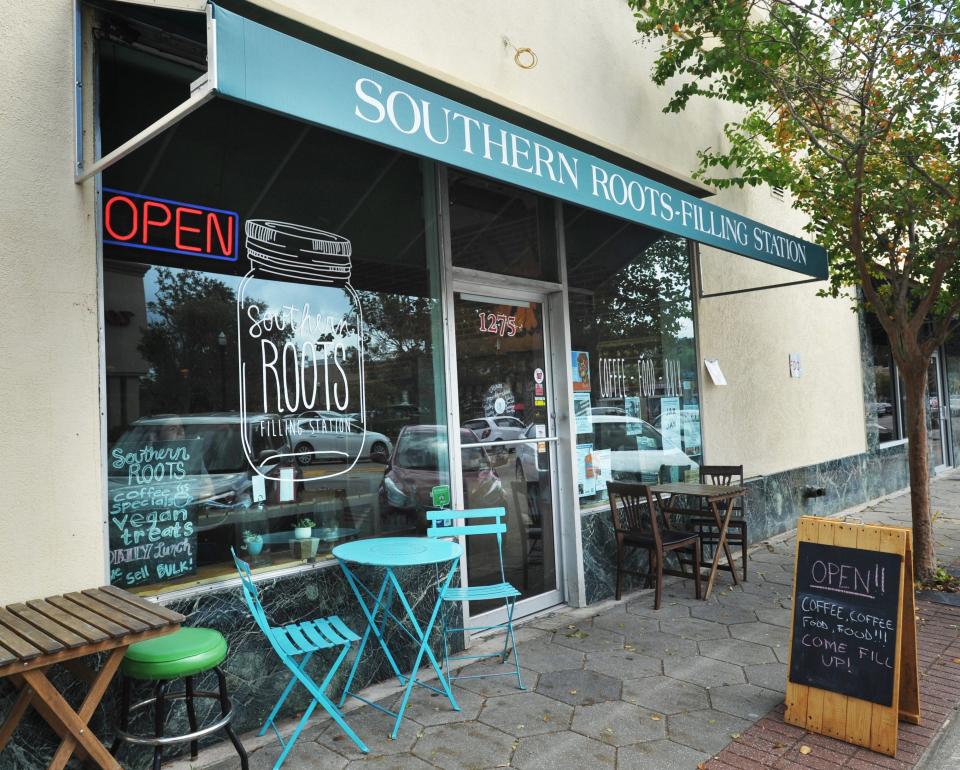Ally Raudenbush: Composting in Jacksonville could save money, local farms and the planet

We have all been in situations when going out to eat where we receive a volume of food that is simply impossible for us to consume in one sitting. We have a few options in this situation: We can take the food to-go, eat until we are at the point of explosion or let the food go to waste, filling restaurant trash cans to the brim.
But what if there was another option?
Composting is the perfect solution. It allows us not to take our leftovers with us every time and not overfill our stomachs, while still avoiding the waste of food.
Food waste is a massive issue, especially in the restaurant industry. In the United States, 4 to 10 percent of food purchased by restaurants is wasted before it even reaches the consumer and approximately 55 percent of edible leftovers remain after people are finished with their meal.
While the root of this issue is oversized portions, restaurant food waste would still be an issue whether portions were reduced or not. I propose that in order to help mitigate this problem, the City of Jacksonville should mandate composting food waste in restaurants.
Composting in restaurants is not unusual, at least outside of the U.S. While studying in Europe this summer I noticed composting in a handful of the restaurants I visited, but most notably in Kantine Freiburg, a restaurant in southwest Germany. Visiting Kantine was an experience unique from U.S. restaurants.
They make sustainability a priority in their menu, sourcing meats and produce from farms just miles from the restaurant and only serving produce that is in season.
Additionally, the restaurant practices both pre- and post-consumption composting. This means that any food waste that is produced while preparing the meals is composted and any food left on consumers' plates when finished eating is also disposed of in a compost bin. This ensures that they are not contributing to food waste, but enhancing the soil quality of the farms which source their food.
Reducing food waste throughout the U.S. is something that needs our attention. It is estimated that approximately 40 percent of food produced in the U.S. is wasted every year and of this, 40 percent of the total waste is from restaurants and grocery stores. Food waste not only costs Americans in lost revenue, but also causes significant harm to the environment due to the release of methane, which is produced when food decomposes in landfills.
Methane is one of the most threatening greenhouse gases with more than 80 times the warming power of carbon dioxide, despite occupying less time in the atmosphere. Landfills and the food waste within them contribute to 17 percent of total U.S. methane emissions, meaning that this waste is contributing significantly to global warming. These stats show that making a change in how we deal with food waste is vitally important.
Seeing how restaurants throughout Europe and parts of America have implemented composting practices shows that making this switch could be easily achievable. If restaurants in Jacksonville alone transitioned to composting practices, it would set a precedent for the rest of the state to make the switch.
Compostable materials include food products such as eggshells, dairy products, fruits and vegetables, beans, paper cartons or packaging, tea and coffee. Essentially, anything other than meat-based restaurant waste can be composted onsite, according to the USDA and FDA. Many restaurants have been reluctant to begin composting despite knowing the environmental benefits, due to perceived burdens, such as additional costs and labor or lack of knowledge of proper techniques.
From Gainesville: Businesses will be forced to donate unused food to pantries or compost under new policy
Guest column: An open letter to local restaurants on takeout containers
Letters: JEA still needs coal to help meet energy needs
However, composting can potentially save restaurants money rather than costing them. Because this waste would be put in a compost bin rather than a dumpster to go to the landfill, the cost of waste collection would be significantly reduced. This would depend on whether a restaurant has onsite composting or uses a compost collection service.
Onsite composting would result in the greatest cost reduction, as restaurants would not have to spend as much on landfill waste removal or frequent compost collection fees. However if this is not feasible, they could use compost collection services that pick up waste and take it to an industrial scale compost facility.
In terms of what these composting policies would look like within individual restaurants, the easiest way to transition to restaurant practices which include both pre- and post-consumption composting would be to have small bins throughout the restaurant where this food waste can be disposed. For pre-consumption composting, this would be best practiced by having small compost bins next to food prep stations instead of just having standard trashcans.
Post-consumption composting is a bit more challenging, as often the contents of people’s plates are scrambled with compostable and meat products all together.
This does not mean that composting food waste is impossible, however. If food appears contaminated (meaning meat and compostable products are mixed) then it would be disposed of in a landfill waste bin, but if the food is not contaminated it must be separated accordingly.

Composting offers a clear benefit in terms of reducing landfill waste and decreasing methane emissions, but it can also help to improve food quality by making organic fertilizers cheaper and more accessible to local farms.
Composting helps plant growth by offering essential nutrients to soil such as nitrogen, phosphorus and potassium in a slow-release fashion, regulating soil pH, improving soil texture and density and regulating moisture levels. Improvements in soil quality and the removal of a reliance on inorganic fertilizers help to improve the quality of food that is produced, as well as reduce the environmental impacts associated with traditional farming.
Composting helps to close the loop of food, so it is not only farm to table, but also table to farm.
Overall, there are very few drawbacks to composting and those that do exist are related to minor added costs or labor. In addition to seeing how restaurants in Europe compost, we can look to the many U.S. cities with zero waste initiatives that include restaurant composting, such as San Francisco; Portland, Ore.; Boulder, Colo.; and more.
These cities have significantly reduced their food waste production and serve as amazing examples of how city-wide composting initiatives can be successful. Many of these cities have seen success due to government run curbside compost collection services, which make cost a non-issue. While there may be initial challenges to implementing city-wide mandatory composting, the numerous benefits associated with the changes far outweigh any minimal costs.

Allison Raudenbush is an environmental science student at the University of Florida, where she is a member of the Outdoor Area Conservation Committee. A resident of Jacksonville Beach, she is a frequent volunteer at the GTM Research Reserve.
This guest column is the opinion of the author and does not necessarily represent the views of the Times-Union. We welcome a diversity of opinions.
This article originally appeared on Florida Times-Union: Closing the loop: Composting may save money, local farms and the planet

